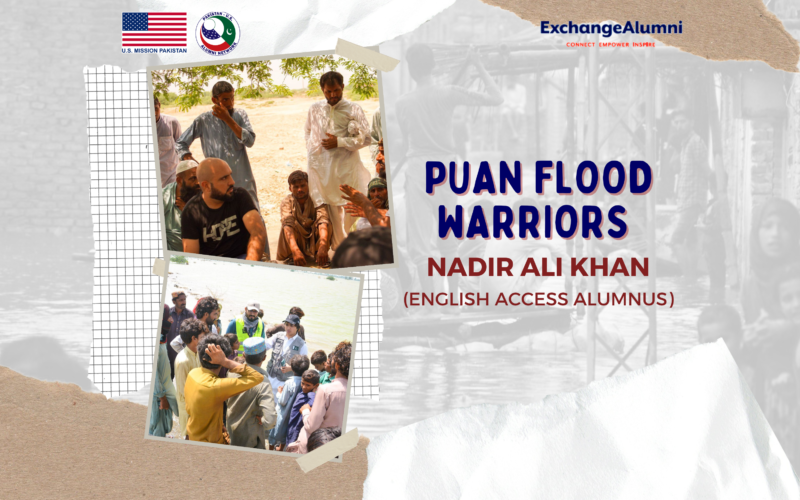During the recent unleash of torrential floods, everything in flood-hit areas was reeling under water, the only thing that refused to die down was the spirit of PUAN flood warriors. As disasters always have a powerful way of bringing out the best in humanity, therefore, the same goes for PUAN flood warriors who have made us see some acts of altruism that might otherwise have gone unnoticed.
With a passion for tirelessly serving humanity, Nadir Ali Khan, our 2014 English Access alumnus responded to the flood crisis by initiating fundraising campaigns. Nadir is CEO of E HANDS which is a registered organization that works for the welfare of people. Most of the team members of the organization are from PUAN.
E HANDS started a flood relief mission when heavy rains lashed the Koh-e-Sulaiman range in Dera Ghazi Khan. Team members identified affected families and distributed tents, solar lights, ration packs, quilts, water coolers, drinking water, hygiene kits, and necessary medicines.
“There was a village I witnessed during my first visit after the flood hit Dera Ghazi Khan. The village had 125 families out of which only 3 to 4 houses and a mosque remained safe above water while the rest of the village was inundated,” said Nadir Ali Khan while talking to PUAN.
The visit made him realize that this unprecedented destruction needs continuous support and Nadir and his team decided to begin a fundraising campaign to collect in-kind donations. In relevance, they set up camps at various locations in Islamabad and different areas. They also ran fundraising campaigns through social media. Currently, they are working in South Punjab, Rajanpur, Dera Ghazi Khan, Dera Ismail Khan, and Taunsa. They are providing dry rations, hygiene kits, tents, and medicines through medical camps. In Khyber Pakhtunkhwa, they are working in Charsadda and Nowshera and a fundraising campaign is underway. They have also moved teams to Swat, and their next working area is Kohistan. In Sindh, their team is providing tents, dry rations, and necessities for the flood-affected families in Tando Adam, Badin, Matli, and Larkana.
“Our next plan is rehabilitation because there is a dire need for rehabilitation to prevent the widespread outbreak of disease because of mud that gets accumulated in the homes and fields destroying the crops. In Punjab and Sindh, there is still standing flood water; therefore, we will start a rehabilitation initiative from some areas of Charsadda and Nowshera where there is no more flood water. 95 percent of people living near these affected areas rely on agriculture to ensure their food security and generate income. We will use tractors and all the available resources to remove mud from their homes and crops. Our team is assessing the needs and preparing accordingly,” said Nadir.

